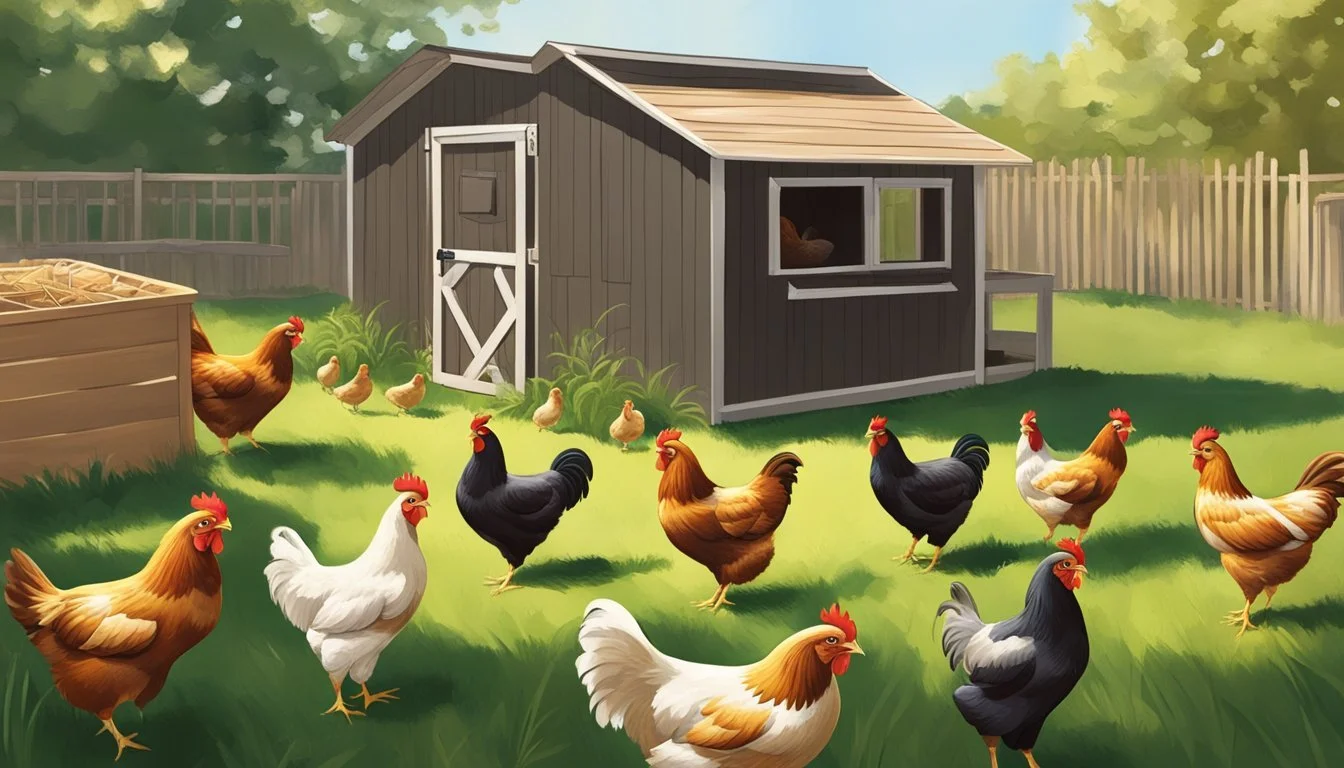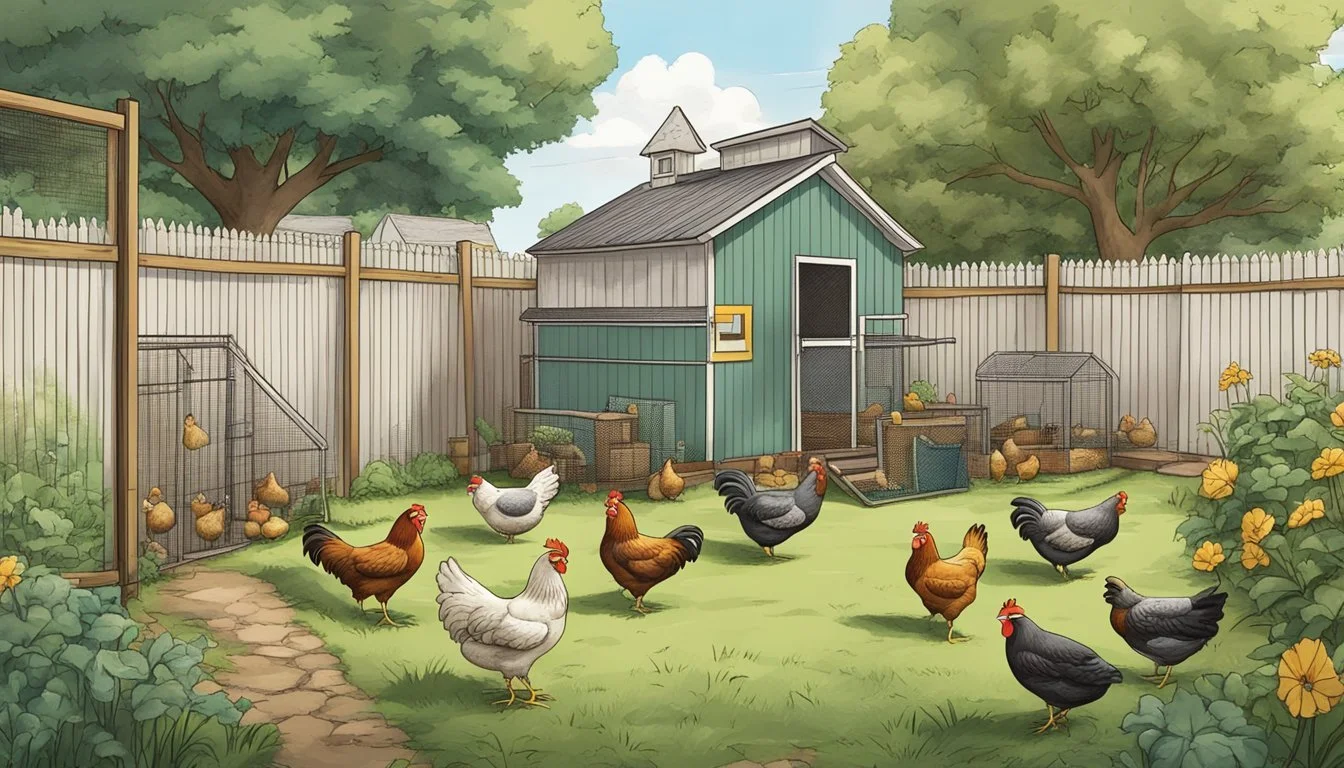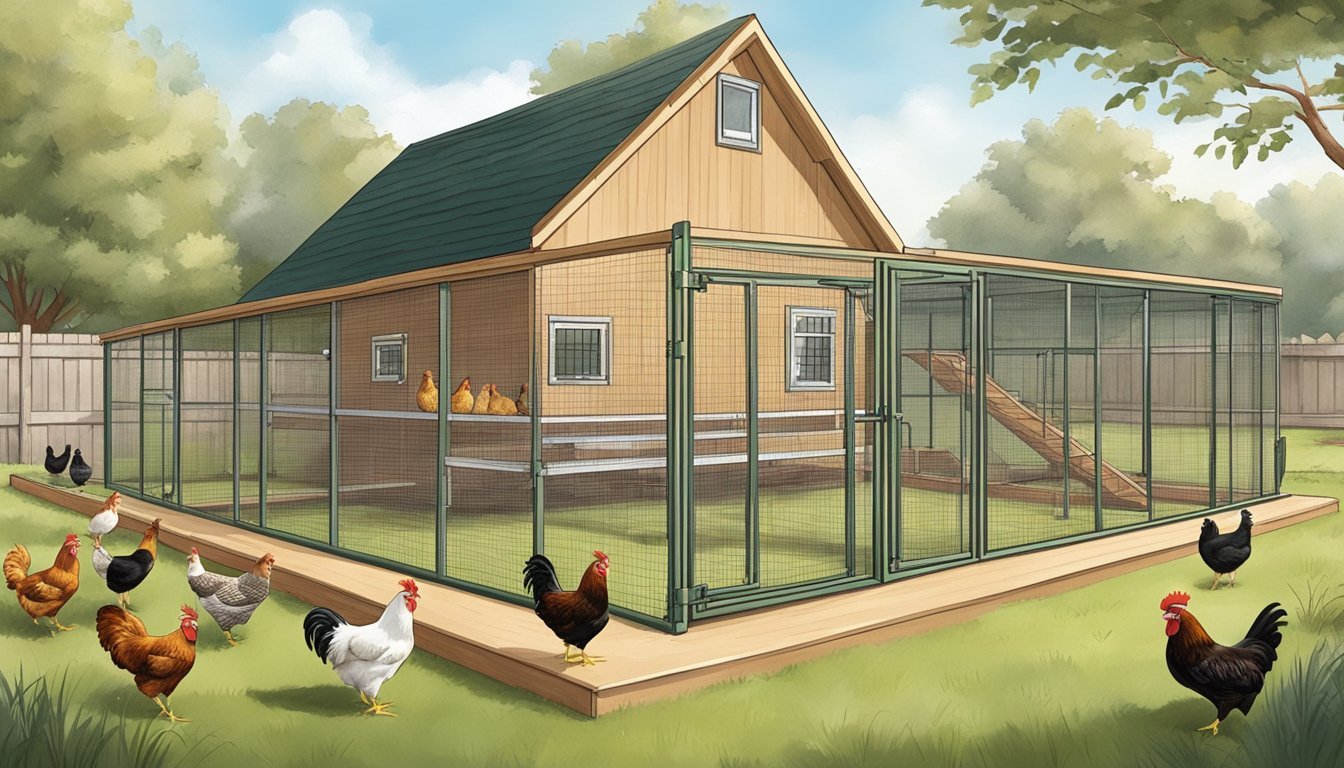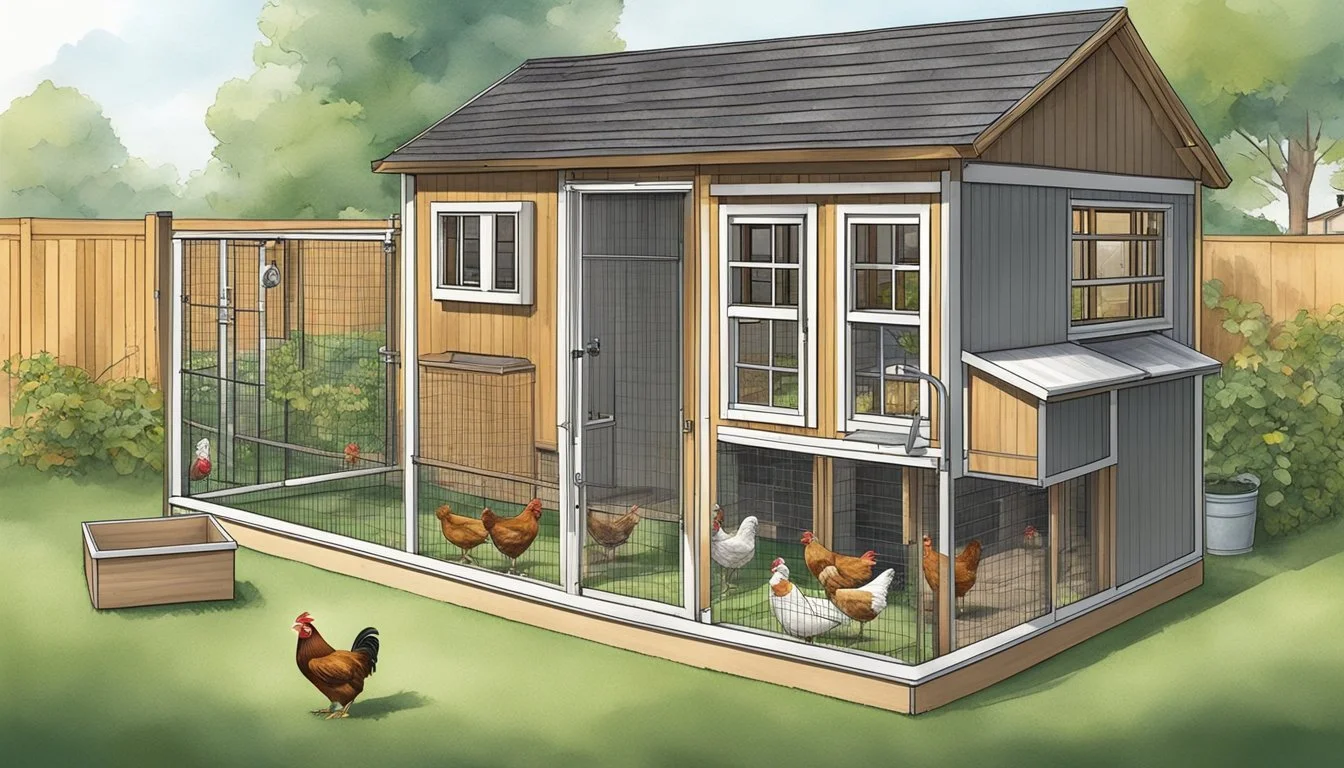Keeping Backyard Chickens in Lincoln, NE
Essential Tips for Urban Poultry Farming
In Lincoln, Nebraska, raising backyard chickens is an activity that locals can participate in, provided they adhere to specific city guidelines to ensure the welfare of both the animals and the community. The city's ordinances allow the keeping of chickens, but with rules that regulate the number and condition under which they may be kept. Residents with an interest in cultivating a small flock must navigate these regulations to maintain compliance with local laws.
To keep chickens in Lincoln, a permit is required, ensuring that the health and safety standards set by the city are met. This process is essential for anyone wishing to keep more than three chickens, which is the threshold where the requirement for a Small Animal Permit comes into play. Permits are issued on an annual basis and include stipulations regarding the number of chickens allowed, particularly specifying a maximum of 20 chickens for lots of one acre or less.
The city's ordinances are designed to balance the benefits of raising chickens, such as fresh eggs and natural pest control, against the potential concerns, such as noise and hygiene. For instance, there are clear standards concerning the maintenance of chicken enclosures to prevent offensive odors and the attraction of pests. This careful oversight helps to maintain the harmony of urban animal keeping with the cleanliness and serenity expected in residential areas.
Legislation and Legalities
The city of Lincoln, Nebraska, has specific ordinances in place regarding the keeping of backyard chickens. Understanding these legal frameworks is crucial for any resident interested in urban poultry farming to ensure compliance with local laws.
Understanding Lincoln's Chicken Ordinance
In Lincoln, Nebraska, city ordinances have been established to govern the keeping of backyard chickens. It is essential for residents to be familiar with these local laws to maintain a proper and legally compliant chicken habitat. Generally, the Lincoln municipal code provides guidelines on the number of chickens that can be kept based on the weight of the chickens and the size of the property.
Permit Requirements and Lot Size Regulations
Residents are required to obtain a fowl permit to legally keep chickens on properties of 1 acre or less. The following table outlines the restrictions based on the chicken's weight:
Chicken Weight Number of Chickens Allowed 3 - 5 lbs 3 - 20 chickens 5 - 20 lbs 2 - 5 chickens
Strict rules also dictate the space required for shelter—typically, the shelter area should be three times the square footage of the number of chickens kept. The permits allowing the keeping of backyard chickens must be renewed annually, which involves adhering to all zoning restrictions and lot size regulations stipulated by the city code of Lincoln. It's also mandated that enclosures should be maintained adequately to prevent odors or attracting pests, with cleaning required at least every five days or as necessary.
Setting Up Your Coop
When establishing a chicken coop in Lincoln, NE, the primary considerations include selecting an appropriate location, adhering to size recommendations for the design, and ensuring the safety and security of the chickens with proper enclosures.
Selecting the Right Location
Choosing the right spot for a chicken coop involves considering sunlight exposure, drainage, and proximity to the house. The location should provide adequate sunlight, which benefits the birds' health and egg production, while also offering some shaded areas for relief during hotter months. It's crucial that the site has good drainage to prevent water accumulation that could lead to unhealthy living conditions. The coop should be easily accessible for care and maintenance, yet maintain distance from living areas to manage noise and odor.
Coop Design and Size Recommendations
When designing a coop in Lincoln, one must comply with local regulations allowing up to 20 chickens on a property of 1 acre or less, with certain guidelines on space and size requirements:
Nesting Boxes: Each chicken requires a nesting box for laying eggs. Generally, one box for every 3 to 4 hens is sufficient.
Space: Provide at least 3 square feet of shelter area per chicken if they weigh between 3 - 5 lbs.
Roosting Space: Chickens need a place to perch. Ensure there is at least 8-10 inches of roosting bar per bird.
The coop should be designed to offer protection from predators and harsh weather, while also allowing for ventilation without causing drafts in the sleeping areas.
Ensuring Proper Enclosure and Safety
Safety is paramount for a backyard flock. A sturdy enclosure protects the chickens from predators, which includes:
Fencing: Secure fencing that extends underground can deter digging predators and should be tall enough to prevent jumping.
Locks: All access points need locks to prevent unwanted entry.
Covered Run: An enclosed or covered run allows chickens to roam safely outdoors.
It is also necessary to have a plan for regular maintenance to preserve the coop's integrity and ensure the chickens' protected environment throughout the seasons.
Chicken Care Essentials
Proper chicken care is crucial for maintaining a healthy flock and ensuring the production of quality eggs. Adequate shelter, consistent nutrition, and routine health checks are essential components of successful chicken raising in the backyard.
Daily Care and Maintenance
Chicken owners must ensure their birds have a clean environment, which includes regularly removing waste to minimize odor and prevent disease. Coops should provide ample space for the chickens to move around and protect them from predators. They need to be well-ventilated but also insulated to keep hens comfortable in varying weather conditions. Daily care tasks include:
Checking waterers for cleanliness and ensuring they are filled with fresh water.
Cleaning feeders and refilling with the appropriate feed.
Collecting eggs to prevent them from getting dirty or being eaten by the chickens.
Handling and Health Monitoring
Regular handling helps in monitoring each bird's health and also aids in keeping the chickens tame. Signs of a healthy chicken include clear eyes, clean feathers, and normal behavior. Key health practices should include:
Observing behavior and appearance daily for early detection of potential health issues.
Weighing chickens periodically to monitor their growth and health status.
Inspecting for parasites and injuries regularly and taking action when necessary.
Feeding and Nutrition
Chickens require a balanced diet to maintain their health and to produce eggs. The basic dietary requirements depend on the age and type of the chicken (e.g., layer hens, chicks, roosters). Here is a simple guide:
Chicks (0-8 weeks): Starter feed, high in protein.
Grower pullets (8-20 weeks): Grower feed, slightly reduced protein content.
Layer hens (>20 weeks): Layer feed, balanced with calcium for egg production.
Provide grit for digestion and oyster shell as a calcium supplement for laying hens. Clean, fresh water should be available at all times.
Neighborly Considerations
Keeping backyard chickens in Lincoln, NE requires consideration for neighbors and the community. This section covers the essential aspects of managing noise and odor, as well as maintaining good relations through proper property line etiquette.
Managing Noise and Odor
Chickens, by nature, can be noisy and may produce odors if their living conditions are not properly managed. It is crucial to keep all chicken pens clean and sanitary to minimize offensive odors, which can become a public nuisance. Regular cleaning not only prevents unpleasant smells but also ensures the health and well-being of the chickens. Sound levels should be considered as well; while chickens are generally less noisy than dogs, homeowners should make efforts to minimize noise during early morning and late evening hours to prevent disturbances to neighboring residences.
Property Line and Neighbor Relations
The placement of chicken pens in relation to property lines is regulated in Lincoln, NE. Chicken owners must ensure that their chicken pens are at least five feet from a neighboring property line and no closer than fifty feet to any neighboring residence. Adhering to these regulations is a sign of respect for one's neighbors and helps maintain harmonious community relations. Consulting with neighbors before installing a chicken coop can also prevent disputes and enhance neighborly goodwill.
Ongoing Compliance and Best Practices
As Lincoln, NE residents consider the benefits of raising backyard chickens, they must also remain diligent in adhering to existing animal control ordinances and municipal codes. Compliance ensures not only the welfare of the chickens but also minimizes nuisance to neighbors and maintains community standards.
Regular Check-ups with Animal Control
Residents are required to facilitate routine check-ups from Animal Control to verify that local regulations are being followed. This may include confirmation of vaccination schedules, particularly against rabies for pets like dogs and cats as identified in the city ordinances. Although chickens are not specifically mentioned for rabies vaccinations, overall health checks ensure adherence to the following stipulations:
Annual permit renewals
Proper shelter maintenance and cleanliness
Noise control, particularly for locales that prohibit roosters
Updating Enclosures as Regulations Evolve
As municipal codes evolve, chicken owners must update their enclosures to remain within compliance. Key considerations include:
Enclosure size: The minimum shelter area should be three times the number of chickens kept, adjusting as chicken weight categories change.
Number of chickens: Depending on land size, residents may keep 3-20 chickens weighing 3-5 lbs. For chickens weighing more than 5 lbs, the amount permitted varies.
Browser updates: To stay informed of the latest regulatory changes, chicken owners should ensure their browsers are up-to-date or consider an alternative browser to access the latest online municipal code.
Regularly reviewing the city's animal ordinances allows owners to make timely adjustments to their practice and avoid potential conflicts with animal control regulations.
The Broader Legal Landscape
In assessing the legal framework surrounding backyard chickens in Lincoln, Nebraska, it becomes crucial to consider local ordinances and compare them with neighboring cities. This comparative perspective sheds light on the region's overall regulatory approach to urban poultry keeping.
Comparison with Nearby Cities and Regulations
Lincoln stands out for its allowance of residential chicken keeping, albeit with strict regulations. Homeowners are required to obtain permits and adhere to the guidelines, such as limiting the number of chickens based on the land size and ensuring proper shelter space.
In contrast, Omaha, Nebraska's largest city, also permits backyard chickens but requires a Health Department permit and a zoning ordinance compliance check. Omaha's approach indicates a more health-oriented perspective in its regulations.
Bellevue, a suburb of Omaha, allows for the keeping of chickens within its residential areas. However, property owners must significantly restrict the number of fowl based on lot size, more so than in Lincoln.
Moving to central Nebraska, Grand Island permits the keeping of backyard chickens, but similar to Lincoln and Omaha, it enforces zoning regulations that must be followed. However, Grand Island's focus is also on the notion of nuisance prevention.
Further west, the city of North Platte presents a lenient stance, with fewer restrictions on backyard chickens, showing variance within Nebraska's cities.
As for Columbus, another Nebraska city, residents may own chickens, but they must comply with local zoning districts definitions and regulations. Here, the emphasis is on the balance between urban farming and maintaining city aesthetics.
While specific regulations about permissible fowl like pigeons or ducks may vary from one city to another, it is essential to seek more information from local authorities to ensure compliance with all relevant city and state laws.








